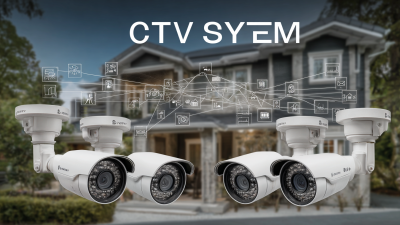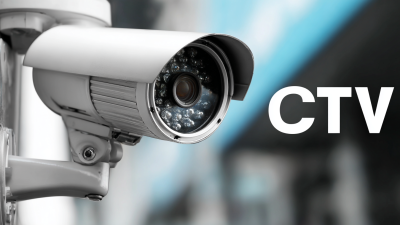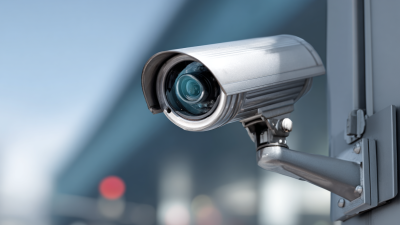Blog
7 Essential Benefits of Installing a CCTV Camera for House Security
In an era where home security has become a top priority for many homeowners, the installation of a CCTV camera for house protection is not just a luxury but a necessity. According to the latest statistics from SecurityInfoWatch, homes without a security system are 300% more likely to be broken into, highlighting the critical need for surveillance solutions. Furthermore, a study by the Electronic Security Association found that 60% of burglars would avoid a home with a visible security camera. As we delve into the ultimate guide on the essential benefits of installing CCTV cameras, we will uncover how these devices not only deter crime but also provide peace of mind, enhance property monitoring, and contribute to a safer neighborhood, making them an invaluable investment for any homeowner looking to bolster their residential security.

Importance of CCTV Cameras in Enhancing Home Security
In today's rapidly evolving world, home security has never been more critical. The importance of CCTV cameras in enhancing home security is underscored by various statistics. According to a study by the Security Industry Association, homes without security systems are 300% more likely to be broken into compared to those equipped with surveillance cameras. This stark contrast highlights how CCTV cameras serve not only as a deterrent but also as a reliable means of monitoring and safeguarding residential properties.
Moreover, CCTV systems provide homeowners with the ability to securely monitor their property in real-time, regardless of location. A report from MarketsandMarkets predicts that the global video surveillance market will reach $62 billion by 2024, driven by the increasing demand for advanced security features. With live streaming and remote access capabilities, homeowners can swiftly respond to any suspicious activity, effectively increasing the chances of apprehending intruders. Thus, installing CCTV cameras is not just about theft prevention; it is a comprehensive approach to ensuring the safety and peace of mind for families everywhere.

Key Advantages of Installing CCTV for Crime Deterrence
Installing a CCTV camera has become an integral part of modern home security, particularly for its role in crime deterrence.
According to a study conducted by the University of North Carolina, properties with visible CCTV systems are 300% less likely to experience break-ins compared to those without. This significant reduction in theft incidents highlights the psychological impact of surveillance cameras on potential offenders, making them think twice before attempting a crime.
Moreover, the presence of surveillance technology contributes not only to deterrence but also to providing valuable evidence if an incident does occur.
A report by the Security Industry Association states that 60% of law enforcement agencies rely on video footage in their investigations, underscoring the importance of CCTV in enhancing both prevention and investigation capabilities.
When homeowners take proactive steps to secure their properties, such as installing CCTV cameras, they not only protect their assets but also foster a safer community overall.
How CCTV Footage Assists in Evidence Collection for Investigations
CCTV footage plays a critical role in modern investigations, providing invaluable evidence that can significantly aid law enforcement. The recent training initiative for Guatemalan investigators highlights the importance of proper photo and video evidence collection, especially in cases involving vulnerable populations. By equipping investigators with the skills needed to gather and analyze video evidence, authorities enhance their ability to build solid cases against perpetrators, ultimately leading to improved protection for women and children in the community.
Furthermore, the power of video evidence is underscored by various international cases, such as the extensive review of 160 hours of CCTV footage in an alleged assault investigation in Dublin. This illustrates how vital CCTV can be in piecing together the events of a crime, providing clarity that can corroborate testimonies or expose inconsistencies. However, while CCTV is a powerful tool, it also comes with challenges such as potential reliability issues, emphasizing the necessity for law enforcement to utilize this technology judiciously to ensure justice is served effectively.
Round-the-Clock Monitoring: The Benefit of Real-Time Surveillance
Installing a CCTV camera for home security offers a multitude of advantages, one of the most significant being round-the-clock monitoring. This real-time surveillance capability is a vital component in deterring potential criminal activity and ensuring peace of mind for homeowners. With a CCTV system in place, families can maintain constant vigilance over their property, which can significantly reduce the likelihood of theft or vandalism. Knowing that their home is under watchful eyes can provide residents with a sense of safety, especially during nighttime or when they are away.
Real-time surveillance also allows homeowners to respond swiftly to any suspicious activity. Thanks to advancements in technology, many CCTV systems now offer mobile access, enabling users to view the footage remotely from their smartphones or tablets. This feature empowers homeowners to keep an eye on their property, monitoring live feeds and receiving alerts when motion is detected. Such immediacy not only enhances security but also allows for quick intervention, potentially stopping criminal acts before they escalate. In a world where security is paramount, the ability to monitor one’s home on a 24/7 basis is invaluable in safeguarding loved ones and valuable possessions.

Cost-Effectiveness of CCTV Systems Compared to Other Security Solutions
When considering home security solutions, the cost-effectiveness of CCTV systems stands out compared to other security measures. A report from the Electronic Security Association indicates that homes with security cameras are less likely to be targeted by burglars. In fact, the presence of CCTV can reduce the risk of burglary by up to 50%, making it a valuable investment for homeowners. Moreover, the initial installation cost of a typical CCTV system can range from $700 to $2,000, depending on the quality and number of cameras. However, the long-term savings from potential theft prevention and lower home insurance premiums often outweigh these initial expenses.
Furthermore, the lifespan of CCTV systems generally spans over five to ten years, with minimal maintenance required. This longevity makes CCTV systems more sustainable financially compared to alarm systems, which often come with recurring monitoring fees that can add up quickly. According to a study by the Security Industry Association, over 40% of households with alarm systems end up paying more in monitoring fees than they would saving on home insurance. Therefore, when evaluating your home security options, it becomes clear that investing in a CCTV system is not just about enhancing safety, but also about making a prudent financial choice.
Related Posts
-

Top 10 CCTV Security Camera Manufacturers from China at the 137th Canton Fair
-

How to Select the Best CCTV Camera System for Your Business Security Needs
-

Your Ultimate Checklist for Choosing the Best Home CCTV System for Global Buyers
-

Ultimate Guide to Choosing the Best CCTV Camera System for Your Home and Business
-

Maximizing Security and Efficiency with Proximity Cards for Business Operations
-

Maximizing Value with Best CCTV Alarm System Through Superior After Sales Support and Future Cost Efficiency
